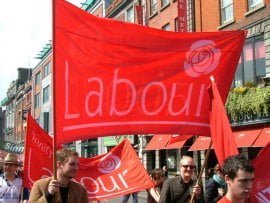There has been much talk recently about how things are improving. But if you take a look beneath the surface, the underlying picture is one of continuing crisis and austerity. Rather than accepting the Tory cuts, the Labour leaders must put forward a socialist alternative.
There has been much talk recently about how things are improving. The green shoots of economic recovery have apparently arrived. House sales are rising, car sales are increasing, and so on. But if you take a look beneath the headlines, the underlying picture is one of continuing crisis and austerity.
While the UK is no closer to reducing the deficit, total national debt has continued to rise to £1.2tn and is on track to hit 90% of gross domestic product. The crisis has imposed costs “that rival those of a world war”, states Martin Wolf in the Financial Times.
The continuing crisis of British and world capitalism, made worse by the slowdown in China, Brazil, India, Russia and Europe, will mean years and decades of austerity.
“We should expect not just 2015 but also 2020 to be an austerity election,” states a report from the Institute for Fiscal Affairs (IFA) and the Institute for Government.
Cuts
Chancellor George “Up-beat” Osborne is seeking £9.8bn of cuts for the first year of the next parliament. But under current spending plans there will be a further 7.6% cut in 2016-17 and 2017-18, equal to £23bn. However, as the economy slows or goes into slump, new tax rises and welfare cuts will be announced.
Spending cuts were set to be a “long-term feature” of UK public finances rather than a short-term experience, the IFA report said. In other words, from the mouths of big business strategists, austerity will be a fact of life in the coming years.
According to official figures, living standards are now at their lowest in a decade after average real incomes fell a further 3% last year. This is an average, which means that significant numbers suffered a much greater fall. This was especially the case of those in work, who had suffered wage cuts and worsening terms and conditions.
The Joseph Rowntree Foundation has shown that, in contrast with earlier periods, by 2011-12 a large majority of poor children now lived in a family with at least one parent working. These are the growing numbers of the working poor.
Absolute poverty rose among children, people of working age and pensioners; in other words, across the board. Katherin Trebeck of Oxfam UK, said that it was “unacceptable that in the seventh-richest country on the planet, we’ve seen the number of people living in poverty increase by nearly a million.”
Britain’s youth face a bleak future. The Institute for Fiscal Studies report called “Living Standards, Poverty and Inequality” in the UK: 2013, confirmed that young people had suffered most from the crisis and risked falling further behind.
“Rising house prices and surging levels of public and private debt mean people in their 20s and 30s are facing a poorer future than their parents”, states City AM (18/6/13)
Stark figures published by the Halifax showed that one in three young people abandoned plans to buy a home just three years after saving up for a deposit.
It is therefore unfortunate that under these circumstances, where working people are experiencing a continuous onslaught, the only alternative being offered by the Labour Party leaders are a watered-down version of Coalition policies.
Labour
Rather than attacking the Tory Coalition, Ed Miliband has reversed his opposition to their welfare cuts.
Even according to the right-wing Compass group, Labour’s message was now in favour of “cuts, cuts and ditching universalism”. Miliband made it clear that he would not be reversing Tory cuts and would implement a regional benefit cap.
“It is only by reforming social security with the right values that we’ll be able to control costs”, he explained. “Social security spending, vital as it is, cannot be exempt from that discipline.” This line was reinforced by Ed Balls, who said that spending would be subject to “iron discipline” and vowed to accept the Coalition’s cuts for the first year of the next parliament.
Whereas the Blairite carpetbaggers are of course delighted by Miliband’s new conversion to austerity, Labour supporters are up in arms at this capitulation. As one former Labour Cabinet minister said: “I would be very worried if they are accepting spending limits for the first year or two of the next parliament. Why on earth would people want to vote Labour?”
Exactly! But this is precisely where the acceptance of capitalism (even of the “responsible” kind) leads. If you accept capitalism, then you must accept the logic of capitalism.
The banks and big monopolies that dominate the British economy will dictate to the government and not vice versa. That has been the lesson of previous Labour governments which promised reforms, but ended up carrying through counter-reforms. Given the crisis of capitalism it is not reforms but cuts that are on the order of the day.
The only programme that can offer a way out of the crisis is to take the economy out of the hands of big business, which is only interested in profit, and place it in the hands of working people.
A socialist plan of production would mean that the resources of society can be used for the benefit of all, and not in the interests of a handful of parasites. On that basis we can end unemployment, build the houses we need, guarantee a living wage for all and slash the working week to 30 hours. This is the real alternative to the capitalist nightmare.






